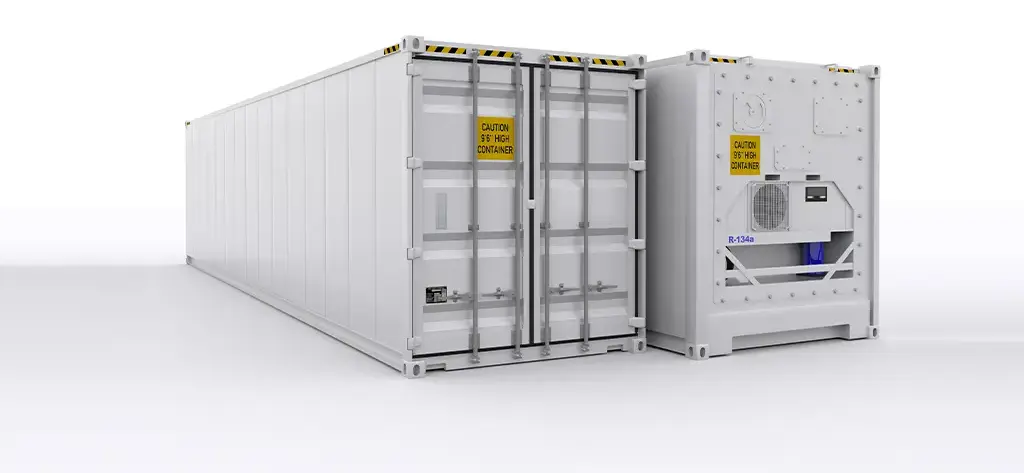Reefer vs. Refrigerated Containers:
What’s the Difference?
When it comes to transporting temperature-sensitive goods, choosing the right container is crucial. While "reefer" and "refrigerated" containers are terms often used interchangeably, they differ in design, function, and application. Understanding these distinctions can help businesses select the most suitable solution for their cargo.
1. Temperature Control
Reefer containers are equipped with integrated refrigeration units, providing precise and consistent temperature control throughout the shipment. They are ideal for maintaining strict environmental conditions, regardless of external temperatures.
Refrigerated containers, by contrast, depend on external cooling systems. While they still offer reliable temperature control, their adaptability to different cooling technologies makes them better suited for broader, less critical applications.
2. Type of Commodities
Refrigerated containers are typically used for frozen or semi-frozen goods such as meat, seafood, or processed foods that must remain solid during transit.
Reefer containers are preferred for highly perishable items—fresh produce, dairy, flowers, and pharmaceuticals—where even minor temperature fluctuations can compromise quality or safety.
3. Design and Construction
Reefer containers are self-contained systems with built-in insulation and cooling units. They’re designed specifically for international shipping and long-haul routes, with technology that monitors and maintains internal conditions in real time.
Refrigerated containers are modular in design. They’re essentially standard shipping containers that can be converted into cold storage using external refrigeration units. This makes them a flexible choice for short-term use or on-site cold storage.
4. Power Source
Reefer containers require continuous external power, supplied by vessels, port facilities, or onboard generators, to operate their internal refrigeration systems.
Refrigerated containers can be powered by various sources, including diesel gensets or solar-powered units, offering enhanced flexibility in remote or off-grid areas.
5. Cost and Use Flexibility
Refrigerated containers are generally more cost-effective due to their simpler design and ability to attach to standard containers. They’re a great solution for businesses needing temporary cold storage or budget-conscious cold chain options.
Reefer containers, while more expensive, deliver reliable performance for critical cargo. Their advanced technology ensures goods arrive fresh and uncompromised, making them ideal for pharmaceutical, agricultural, and high-value shipments.

What Is a Reefer Container?
A reefer (refrigerated freight) container is a purpose-built, temperature-controlled shipping unit used to transport perishable or climate-sensitive goods. These containers offer:
- Integrated refrigeration systems for precise cooling or heating
- Insulated walls to prevent temperature fluctuations
- Ventilation and humidity controls for added cargo protection
- Monitoring systems to track conditions in real time
What Is a Refrigerated Container?
A refrigerated container, often referred to as a “reefer box,” is a modular solution that uses an external cooling unit to transform a standard container into cold storage. They are ideal for:
- Temporary or seasonal use
- Flexible on-site cold storage
- Multi-purpose transport needs
FAQs
Can a Reefer Container Be Converted Into a Refrigerated Container?
No. Reefer containers have an integrated system built into their structure. They are fundamentally different from modular refrigerated units.
Which Option Is More Cost-Effective?
Refrigerated containers are typically more affordable and versatile for general cold storage needs. However, for high-risk, high-value, or sensitive goods, investing in a reefer container ensures better protection and performance.
Your Cold Chain Partner:
At ACS Logistics Co., we understand the complexity of temperature-controlled logistics. Whether you're shipping across the globe or storing goods on-site, we offer:
- Tailored cold chain solutions
- Access to both reefer and refrigerated containers
- Expert support and regulatory compliance
- Advanced tracking and security systems
We help you make informed choices, so your sensitive cargo arrives in perfect condition—every time.
Contact ACS Logistics Co today for smart, secure, and reliable cold chain logistics.
Refrigerated vs. Reefer Containers: Understanding the Key Differences